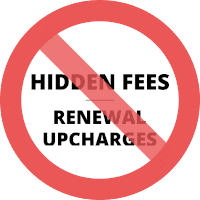
What are Name Servers and DNS Records?
Many people ask us what name servers are, what DNS records are, and what the difference is between the two. This article will provide a general overview about these topics, but we will not get into the more technical aspects of this discussion. If you are interested in further information on name servers and DNS records, we would recommend clicking the links below and searching other online resources where you will be able to find many more details covering the more technical aspects concerning these topics.
Name servers
Name servers "tell" DNS resolvers how to locate DNS records for a domain. When you associate name servers with your domain, you are telling DNS resolvers throughout the Internet to "look here" for the appropriate DNS records for the associated domain(s). The DNS records control for example, what web server(s) to use for the web site and what mail server(s) to use for email. If you are using a particular hosting provider for your web site and/or email, it oftentimes makes sense to use their name servers since they will typically configure the appropriate DNS records for you.DNS Records
DNS records, also referred to as "Resource Records" in our system, help control, amongst other things, where requests are routed for important services related to your domain. For example, assuming you wanted Google to host email for a specific domain, adding the correct MX resource records on the name servers associated with your domain would accomplish this. You can think of DNS records as controlling how your domain is configured. Accordingly, if you wanted to change your hosting provider, DNS record changes are often all that is required.Examples
Below are a few examples describing how DNS records and name servers work together:-
When you attempt to load a web site, you use your ISP's DNS resolver to determine where the DNS records are for that web site. For example, when you enter a web site address into your browser, your ISP's DNS resolver first determines which name servers are associated with the domain. Your ISP's DNS resolver then "asks" those name servers for the DNS record it requires.
The most common example related to web sites is the "www" DNS record for the domain. Using our example above, if you entered "www.example.com" into your browser, here is what would happen:- Your ISP's DNS resolver would determine which name servers were associated with example.com.
- Your ISP's DNS resolver would ask those name servers for the DNS record associated with "www" for that domain.
- The name servers would respond with the A/AAAA/CNAME record.
- Your ISP's DNS resolver would then use that response to direct your request to load the web site to the server upon which www.example.com is hosted.
-
Another example that impacts most of us each day is sending email. The steps to send an email to an example.com email address are basically the same as loading the www.example.com web site:
- Your ISP's DNS resolver would determine which name servers were associated with example.com.
- Your ISP's DNS resolver would ask those name servers for the DNS record(s) (in this case, MX record(s)) associated with example.com.
- The name servers would respond with the MX record(s).
- Your ISP's DNS resolver would then use that response to direct your email to the server which handles email for example.com.
Why can't I have my DNS records with NameSilo if not using NameSilo's name servers?
Per the explanation above, DNS records need to be kept with the name servers for your domain. This is the reason you will see a big, bold red box on the top of the DNS Manager page for any domains not using our name servers. In short, our system is warning you that any DNS records you enter into our system will not be used because DNS resolvers will not look to our system for DNS records for your domain. Again, when DNS resolvers are looking for DNS records for a domain, they will only "ask" the name servers associated with the domain. This is why you would not want to maintain your DNS records with us if you are not using our name servers. Anything you entered would be entirely irrelevant because no DNS resolver would ever look for records in our system. Instead, DNS resolvers will look for records only from the name servers associated with the domain.Should I use NameSilo's name servers?
Unfortunately, this is not a question we can answer for you. The only thing we can tell you is that if you would like to use our system for DNS, then you would need to use our name servers. A more detailed discussion concerning which name servers to use can be found here.









